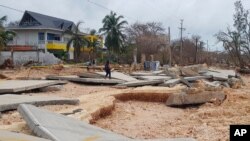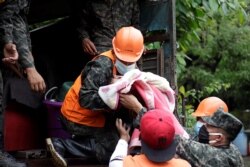People in Central America and the aid agencies lining up to help them are bracing for the potentially catastrophic consequences of Hurricane Iota, just two weeks after Hurricane Eta made landfall in the region, causing death and destruction and affecting nearly five million people.
World Meteorological Organization spokeswoman Claire Nullis said that, for the first time on record, the Atlantic has had two major hurricanes in November — a time of year when the season is normally winding down.
Nicaragua, Honduras and other parts of Central America have not recovered from Hurricane Eta, yet are being slammed by Iota, with risks of flooding, mudslides and landslides, Nullis warned.
In anticipation of Hurricane Iota, International Red Cross Federation volunteers have been positioning basic relief items in Nicaragua, IFRC spokesman Matthew Cochrane said. In addition, he said, the Red Cross has positioned rescue boats in Honduras, in anticipation of launching major search-and-rescue operations once the storm passes. The Red Cross also was involved in preventative evacuations over the past few days.
Spokesman for the U.N. Office for the Coordination of Humanitarian Affairs, Jens Laerke, told VOA it is too soon to know the extent of damage caused by Iota, but said the impact is likely to be worse than that from Hurricane Eta, which is growing in severity.
"For example, Honduras authorities now report that three million people are affected. That is one million more than the figure that they reported last week," Laerke said. "In Guatemala, we are talking about 900,000 people directly affected by Eta. That is nearly triple the figure from the previous weeks."
Eta is still a developing emergency made far worse by Hurricane Iota, Laerke said.





